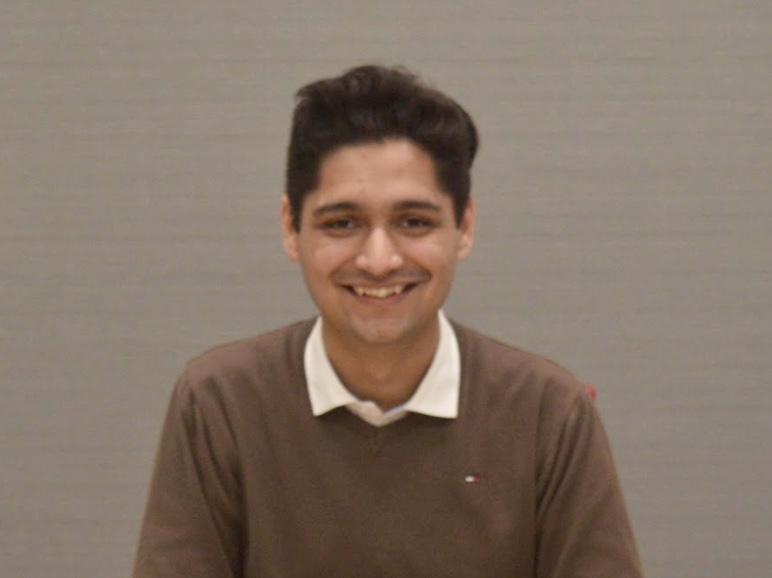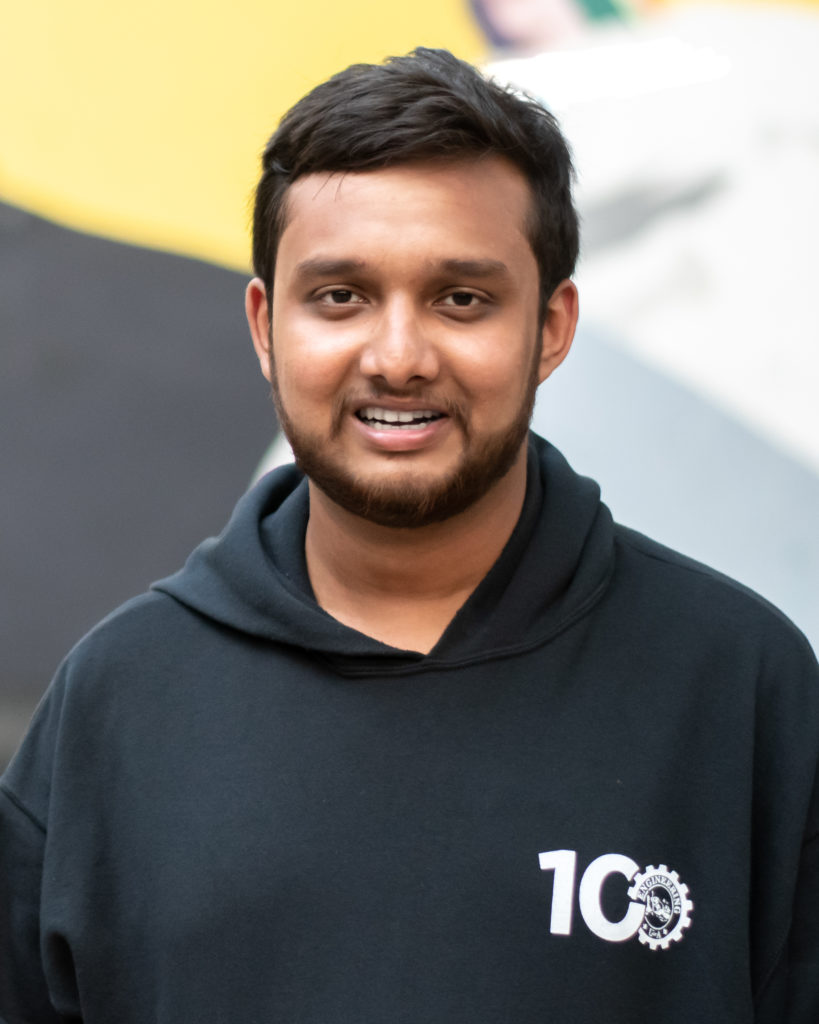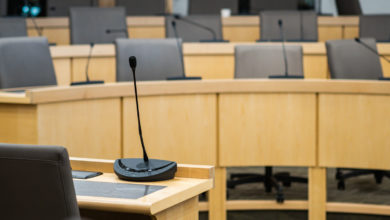SU Elections 2021 Q&A: Faculty of Engineering Students’ Council and GFC Candidates
Meet a few of the engineering students running for Students' Council and GFC in this Q&A.
 Willow Austin
Willow AustinThis article is part four of a seven-part series.
Although the election for Students’ Union executives is over, it’s now time to for students to vote for Students’ Council and General Faculties Council (GFC) representatives.
On March 17 and 18, undergraduate students will be voting for both the Students’ Council councillors and GFC representatives for their respective faculties.
Students’ Council oversees the Students’ Union in terms of its policies, financials, and mandate. It consists of 40 councillors.
GFC is the highest academic decision making body at the university. Out of its 159 members, there are around 40 undergraduate representatives.
To help students get to know the candidates, The Gateway interviewed them to learn more about how they would represent students and what issues they hope to address in these roles.
Responses have been edited for brevity and clarity.
Engineering Candidates
The Gateway reached out to all candidates, but only the following participated. See a full list of candidates here.
- Chanpreet Singh, a third-year computer engineering student — running for GFC.

- Andrew Batycki, a third-year civil-environmental engineering student — running for Students’ Council and GFC.

- Tahmid Al Hafiz, a second-year engineering student — running for GFC.

Why are you running for Students’ Council/ GFC?
Chanpreet Singh: Strong student representation in GFC is essential, especially this year. Our university is undergoing large-scale changes, and restructuring is not yet over — we are yet to set metrics and continue the restructuring work. The faculty of engineering is a part of a new college and it’s essential that we are able to advocate firmly for better representation of the engineering students within the new college. With the formation of a new college, a lot of things will be changing within our faculty too. By being in GFC, I will be able to make an impact and safeguard engineering students’ interests. Earlier this year, I have brought forth three motions to GFC as president of the International Students’ Association (ISA) to resolve the online learning issues, and it was really hard for me to advocate for these issues by not being a GFC Member. Thus, I have decided to run for GFC to be better able to advocate for students and their learning needs. I have seen that only a few current GFC student members actively take part in GFC and this is what I want to change. [I want to] be where engineering students need me to speak for them.
Andrew Batycki: I’m running for re-election on student council because I believe it is important to have strong student leaders. If re-elected this will be my third year on council and I believe that makes me well-equipped to tackle many issues that are impacting engineering students right off the bat. I know how council works and I can use that knowledge to represent the interests of engineering students. Some of the work I’ve done on council previously includes helping write an open education policy for the Students’ Union, helping update the UASU Cares page to make resources for survivors of sexual assault more accessible, and helping write the adjudication documents for the student Green Fund Grants. In a year where tuition is rising by seven per cent, strong student leaders are necessary. If re-elected, I will use my experience in student government to stand up for all engineering students.
Tahmid Al Hafiz: My core aim for securing a seat in the General Faculties Council (GFC) is to empower this massively talented, diverse student body and protect their rights at all costs. Whether or not we choose to admit it, there are a plethora of major issues that need to be addressed — unfair academic challenges, systematic racism, governing inefficiencies within the institution. General Faculties Council, being the highest legislative body within the University of Alberta, is the perfect platform for me to exercise my power and raise the voice on behalf of my fellow students with a strong intention to resolve all these issues.
Can you explain your platform concisely?
Singh: I am advocating for four major things: to resolve online learning concerns, greater student representation, transparency and accountability, and to safeguard engineering student’s interests in the new college model.
I want to advocate for making lectures recorded, banning participation grades and reducing the use of the [Smart Exam Monitor] (SEM). These things shall help thousands of students in our faculty, especially international students, students who parent, and students with poor internet connectivity. I also want to make sure that when new committees are made or current committees are restructured, we are able to advocate for greater student representation in those committees as most of the work gets done there. If I get elected, then I want to make sure that I am fully transparent and accountable, thus I will ensure that when I say engineering students want this, I actually have consulted and reached out to them prior to fully knowing what you want. I want to be there for engineering students and not just myself.
Last, and most importantly, I want to make sure that engineering students’ interests are safeguarded in the new college model. We are a huge faculty with over a century of history. Thousands of engineering students’ voices need to be heard when new colleges formation is being implemented. I have been extensively involved in student governance and know how things are done at our university, so I will only talk about things that will be done and not only promise [things] to be forgotten.
Batycki: My platform this year focuses on three areas. First I want to focus on fighting harmful fee increases. There is a lot of room to advocate for preventing increases in student fees and other non-tuition costs such as textbooks. Second, I will try to increase engineering student engagement in the SU. This year if re-elected I plan on making myself more accessible to students so I can share their concerns more effectively. Finally, I want to help make the SU more inclusive and accessible to all students.
Al Hafiz: My platform will primarily focus on being a strong & powerful voice on behalf of the faculty of engineering as the university ventures into a new era of collegial governance. Besides that, a top priority will be advocating profoundly against the unfair tuition fee increase. It is of paramount interest to me that the students get the most out of their hard-earned money, that all the services that this money is spent on are beneficial to them, and that every penny we pay is logical and justified. Fighting to overcome all the current academic challenges revolving around remote learning will also be a key point. Accommodating the large body of international students currently living overseas by dissolving synchronous labs. Adding mandatory alternate exam times for all courses is an idea that I will pitch under this manifest.
Furthermore, I will definitely lobby to have all labs and assignments suspended during midterms season, as most students, including myself, found the workload during that time very overwhelming. The lack of consistency in the difficulty of exams is something I am extremely concerned about. Hence, ensuring fair difficulty of exams is a pivotal idea — just because exams are ‘online’, doesn’t justify the overly difficult and lengthy exams that are being thrown at us these days, right? Last but not the least, I shall also profoundly push to abolish online proctoring because, in my opinion, it is clear discrimination against students living in shared residences, student parents, and students dealing with anxiety or other mental health issues.
For Students’ Council Candidates: what is the biggest issue you see facing the Students’ Union and how would you want it addressed?
Batycki: The biggest issue facing the Students’ Union is the large tuition increase facing post-secondary students. I believe we need stronger external advocacy to combat this and better coordination between the Students’ Union and student unions at other post-secondary institutions in Alberta.
For Students’ Council candidates: what is an issue you see facing engineering students specifically and how would you want the SU to address it?
Batycki: A large issue facing engineering students right now is online learning. Because engineering is a professional program and most students are taking 6 classes a term, this semester has been really hard on a lot of people. Many professors have increased workload and made tests harder using academic integrity as an excuse. I think the Students’ Union needs an online learning policy. Online learning advocacy shouldn’t just be waved aside because the majority of students are going back to in-person learning in the fall most likely.
For Students’ Council candidates: how will you make sure to represent the needs and concerns of your faculty to Students’ Council?
Batycki: This year I plan on working with Engineering Students’ Society (ESS) to create a google form that is accessible to all engineering students. The goal is to make it easy for all engineering students to raise concerns to their student leaders so we can effectively advocate on their behalf.
For Students’ Council candidates: how will you ensure SU executives remain accountable?
Batycki: This is what question period in Students’ Council meetings is for. I know most of the incoming executive and I know they want to do the best they can for students. However, if they aren’t going to stick to their promises, I’m going to call them out on it.
For GFC candidates: what do you see as the largest academic issue facing students right now and how would you like GFC to address it?
Singh: The largest academic issue that engineering students are facing right now is online learning issues, such as lectures not being recorded, participation grades forcing students to attend the zoom lectures, and the use of SEM to proctor students. These are issues that I have been actively working on as the president of the ISA. But, by not being a member of GFC, my ability to effectively advocate for them is inhibited. Students are suffering from the fear that their internet connection will disconnect while writing exams. The amount of pressure created by being constantly monitored while writing exams prohibits students from giving their best in exams. The University of Alberta needs to move on from SEM and use alternative ways to conduct assessments. Many other universities have already banned the use of remote proctoring software such as SEM. Our [next] fall semester [will likely be] partially online and we need to resolve these issues now —we simply can’t wait anymore.
Batycki: Academic restructuring is the largest academic issue facing students right now. I think GFC needs to be clear in their recommendations to the Board of Governors and they need to be more vocal when the board overrides them like we saw with the decision to make executive deans.
Al Hafiz: In my opinion, the largest academic issue students are facing right now is still the challenges of remote learning. Yes, many of us have adapted to it, but imagine studying 15 years of your life going to school in person, and now suddenly having to fit the entire experience inside a computer screen. Despite the announcement of hybrid in-person classes and the increased number of in-person classes starting Fall 2021, we all know that online learning at the U of A will definitively stick around for a while. Many of us, would still have to take up a few classes which may only be offered online. Whether or not the students managed to learn properly from the online lab components of various engineering courses—which were originally designed to be performed in person and have done so for decades — still remains a burning question. Furthermore, being one of the most international and global universities in the world, we have a large proportion of students coming from overseas. Trust me, staying up till 4 a.m. to attend calculus exams is not so fun for international students, and is also not fair. While many instructors voluntarily provide class recordings and alternate exams for students in different timezones, and we are truly grateful to them, many course instructors still do not recognize the hardship that is faced by students living in distant timezones. Thus, many courses still have synchronous, mandatory lab periods and just one exam time.
For GFC candidates: How will you ensure the student voice is heard at GFC?
Singh: I am known for making sure that student voices are heard. I have always been very vocal when it comes to students’ interests. In my other roles in student governance such as ISA President, I have openly called out the university to resolve online learning issues and [played a role] in the university creating a task force. I have also been vocal when international students were excluded from the U-Pass alternative in September or when students were kicked of out of residence. I try to work with soft politics and internal advocacy but when there is a point they don’t work anymore. That’s when I become vocal and publicly raise the issue to make sure that the thousands of students I speak on behalf of are being heard. I will commit to engineering students that they will see me speaking on their behalf boldly and firmly to safeguard their interests.
Batycki: It comes down to making sure the student caucus has a strong united voice and that all student representatives understand Robert’s Rules so they can contribute in meetings. Given my experience on Students’ Council, I understand how meetings like this work and I can make sure student voices are being heard.
Al Hafiz: The best possible approach to raise a powerful, appealing voice at the GFC is through unity. If elected, my goal is to effectively collaborate with the five other engineering GFC representatives to curate feasible, compelling ideas that will be beneficial to the entire engineering students’ community in the long run. The strength of an idea multiplies exponentially when there are enough people standing behind it. Should we, the Engineering GFC representatives, collectively back an idea, we must be equally confident that this motion is good enough to pass, and shall eventually pass.
For GFC candidates: What does collegial governance mean to you and why is it important for students?
Singh: This is something that’s very dear to me. I have always worked on implementing the use of collegial governance in ISA’s councils. Whenever we had issues that our councils were divided on, rather than focusing on the majority vote, we always worked on having more discussion and getting a stronger consensus. GFC itself has been pushing strongly for collegial governance to be followed in the functioning of the new colleges. I want to make sure that as an engineering GFC councillor, I am always in strong support of collegial governance principles, and pushing for their implementations. Collegial governance is very important for students [because it ensures] student voices are not being heard for a procedural sake, but rather students are being considered as important stakeholders in all decisions being made. Collegial governance means shared governance and in our university, this shall enable students’ voices to be heard more seriously.
Batycki: Collegial governance is important because it means the Board of Governors should listen to bodies like GFC, which have student voices on them. Essentially it means that decisions are taking into account a large variety of voices instead of one group of people. That’s why it was very disappointing to see the board overrule GFC’s decision on academic restructuring this year by implementing executive deans.
Al Hafiz: For the first time in the 113 years of this great university’s history, we are entering a new system of collegial governance. How well the students cope with it and how efficiently the administration performs under this structure, will be interesting to watch. This is one of the biggest changes the students have faced in years and shall play a pivotal role in shaping student politics at the U of A in the coming days. While adopting the collegial governance system was a highly debated decision, we must also take into account the fact that due to the contraction of the university budget, there were only a few options left. Processes in this model of governance are lengthier due to the prolonged chain of command structure. We only hope that it does not become tedious for students by any means and our university does not become another example of a ‘broken’ collegial system.
Fun Question 1: If you had to eat at one SUB vendor for the rest of your life, which one would you choose?
Singh: Marco’s Famous.
Fun Question 2: What quarantine hobby have you picked up?
Batycki: I’ve taken up yoga during quarantine.
Al Hafiz: Watching videos of birds in people’s backyards!




